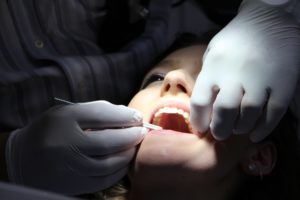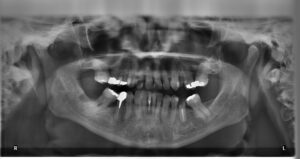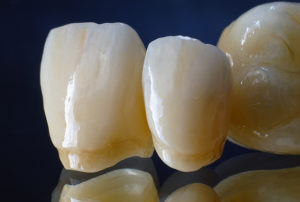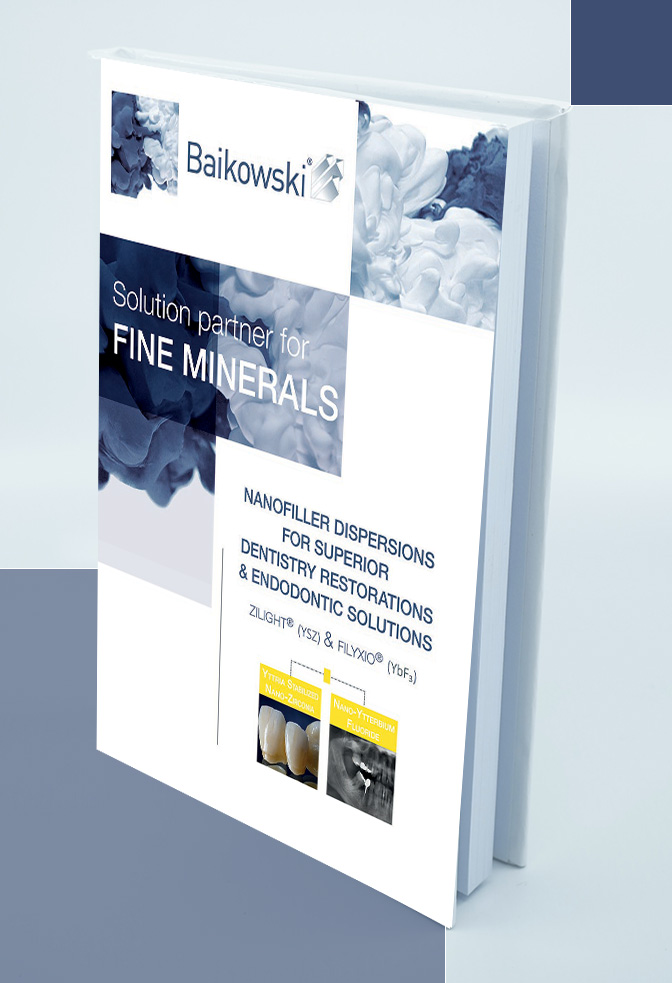Discover Mathym® nanodispersions
Nanofillers as game-changers for Restorative Dental Applications
Nano Yttria Stabilized Zirconia
 Combining hardness and transparency has been a challenge in dental restoration.
Combining hardness and transparency has been a challenge in dental restoration.
Indeed, polycrystalline transparent ceramics have unique physical, mechanical, and optical properties that make them ideal for various applications, including dental restoration. However, the fabrication of these ceramics requires high temperatures and long densification times to eliminate residual pores, which can scatter light and reduce transparency.
Luckily, recent advancements in nano-sized Yttria Stabilized Zirconia (YSZ) have opened up new possibilities whenever a combination of optical and mechanical properties is required.
YSZ is known for its excellent mechanical properties, such as high strength and fracture toughness, and it can also be engineered to exhibit optical transparency by adjusting the yttria content, particularly in the 8 mol.% range. Therefore, optimized chemical compositions, such as those of the zilight® range, allow to achieve an excellent isotropic refractive index.
Moreover, research carried out with Mathym® aqueous colloidal suspensions of yttria-doped zirconia nanoparticles has demonstrated that the scattering efficiency of residual pores decreases significantly as the pore size decreases into the nano-range. In conclusion, reducing the grain size of polycrystalline ceramics to less than 100 nm can increase transparency while maintaining high mechanical performance.
Nano Ytterbium Fluoride
YbF3 nanoparticles has gained recognition as a promising nanofiller in dental composites, that aims at providing functional, durable, and esthetic dental restorations. The benefits of Mathym® filixio® nanodispersions include:

- High radiopacity to ease the monitoring of the restorations integrity over time and to ensure accurate diagnosis,
- No detrimental impact on resin polymerization process,
- The high surface area-to-volume ratio that improves the mechanical properties, such as flexural strength and wear resistance,
- The small size (20nm) that results in improved optical properties, such as translucency and color stability.
- The prevention of secondary caries formation due to fluoride ions release, which inhibit the growth of cariogenic bacteria and promote the remineralization of enamel.
Furthermore, Mathym® nanoparticle functionalization enables the compatibility with different dental monomers even at high concentration of nanoparticles.
Nano-cerium & Calcium Fluoride
 These Mathym® under development bioactive materials have shown antibacterial properties that could solve most of the problems related to the formation of secondary caries around dental composite restorations and can contribute to remineralization.
These Mathym® under development bioactive materials have shown antibacterial properties that could solve most of the problems related to the formation of secondary caries around dental composite restorations and can contribute to remineralization.
Mathym’s dental nano solutions are used as nanofillers to optimize the properties of the composite, such as a high refractive index, good UV absorption capacity, flexural strength, and hardness…
Download our white paper to learn more and do not hesitate to contact our team to discuss your needs, including product customization!
Nanofiller Dispersions for Superior Dentistry Restorations & Endodontic Solutions WHITE PAPER
ZILIGHT® (YSZ) & FILYXIO® (YbF₃)

